Join a CSA Program and Eat Healthy
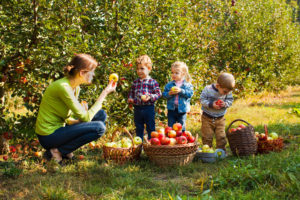 The fields may be barren this time of year, but Shenandoah Valley farmers are ramping up for the 2020 growing season. Now is the time to learn more about Community Supported Agriculture programs and sign up for some delicious, healthy eating.
The fields may be barren this time of year, but Shenandoah Valley farmers are ramping up for the 2020 growing season. Now is the time to learn more about Community Supported Agriculture programs and sign up for some delicious, healthy eating.
What is community sponsored agriculture?
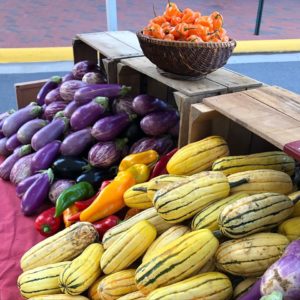 Community Supported Agriculture, or CSA, is a commitment between farmers and those who support locally sourced food. Consumers buy a “share” which entitles them to weekly (or bi-weekly) products from a farm during the growing season. While CSA’s have traditionally centered around fruits and vegetables, they’ve now expanded to include meat and poultry, as well as “hybrids” that offer both produce and protein.
Community Supported Agriculture, or CSA, is a commitment between farmers and those who support locally sourced food. Consumers buy a “share” which entitles them to weekly (or bi-weekly) products from a farm during the growing season. While CSA’s have traditionally centered around fruits and vegetables, they’ve now expanded to include meat and poultry, as well as “hybrids” that offer both produce and protein.
When you join a CSA, you pay for your share of the harvest up front and accept the risk of what the growing season may bring. There may be times when there’s an abundance of one crop and scarce pickings for another – that’s farm life. But this shared risk builds a sense of trust and community between those who grow the food and those who support CSA programs. And farmers have a great sense of responsibility to their CSA members. When certain crops are scarce, they make sure their members get first pick.
Advantages of Community Sponsored Agriculture
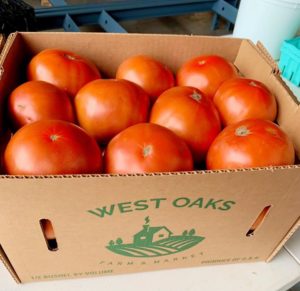 The most obvious advantage to joining a CSA program is healthy eating. You’ll enjoy fresh, locally sourced food. But there are other benefits as well. You’ll have the opportunity to try new foods that you might not have considered before. Kids typically favor food from “their” farm and they’ll learn how their food is grown. And you’ll develop a relationship to the farmer who provides for your table.
The most obvious advantage to joining a CSA program is healthy eating. You’ll enjoy fresh, locally sourced food. But there are other benefits as well. You’ll have the opportunity to try new foods that you might not have considered before. Kids typically favor food from “their” farm and they’ll learn how their food is grown. And you’ll develop a relationship to the farmer who provides for your table.
CSA programs offer advantages to farmers as well. They provide a way for farmers to market their products before the growing season begins. The advance share payments help the farm’s cash flow. And farmers develop community relationships with those who purchase their products.
Is CSA Right for You?
Before signing up, it’s important to determine if CSA is even right for you. How do you feel about paying upfront for your product and the concept of shared risk? If it’s a significant concern, you’re probably better off getting your locally sourced food at a weekly farmers market.
Then there’s the matter of all that harvest bounty. You’re going to receive five to 20 pounds of fresh produce regularly. And you may find items in your box you’ve never tried. If your “veggie repertoire” is limited, a CSA may not be right for you. But if you enjoy vegetables and like discovering new foods, it’s a great way to expand your horizons.
You’ll also need to figure out what to do with any excess product. Food waste is one of the biggest reasons consumers don’t renew CSA memberships. So make sure you have a plan to share what you can’t eat. Many CSA programs offer shares that work well for individuals, couples, and small families.
And since you’ll be working with a raw product, be prepared to spend more time in the kitchen. Ask yourself if you like to cook and have the time for it. And finally, are you committed to picking up your weekly (or bi-weekly) share? While some farmers offer delivery services, you’ll typically need to go to the farm or a community drop off point.
How to Choose the Right CSA Program
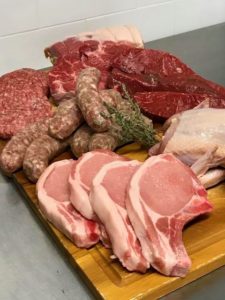 Once you determine that a CSA program is right for you, it’s important to choose the one that best fits your needs. While you can learn a lot about a farm’s CSA program through their website, it’s always great to actually talk to the folks who’ll be growing your food. Ask them about their experiences with Community Supported Agriculture.
Once you determine that a CSA program is right for you, it’s important to choose the one that best fits your needs. While you can learn a lot about a farm’s CSA program through their website, it’s always great to actually talk to the folks who’ll be growing your food. Ask them about their experiences with Community Supported Agriculture.
Find out what past harvests have yielded, keeping in mind that Mother Nature offers no guarantees. Is the product pre-packaged or is the program modeled after a more “pick you own” approach? And be sure to ask if all the produce comes from that farm specifically or if other items are brought in to supplement the shares. If so, then find out who grows those supplemental products.
When it comes to joining a CSA program, you need to keep your expectations within reason. Seasonal products still need to be supplemented with trips to the grocery story. And the weather always has the last word when it comes to farming. Running a successful CSA program requires years of experience. But don’t be afraid to support a new program. Just keep in mind that it may have a few growing pains. Remember, you’re not just buying food. You’re building a relationship with someone deeply connected to their land.
Great CSA Programs in the Shenandoah Valley
The Shenandoah Valley offers a wide variety of CSA programs. You’ll find produce boxes, protein packages and even a hybrid offering locally sourced goodies. With your new found CSA knowledge, pick the program that’s right for you.
A Classic CSA Program: West Oaks Farm
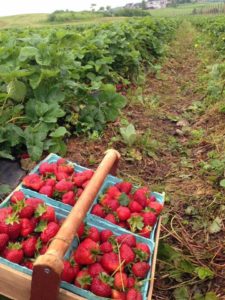 Located just outside Winchester, this is the fifth year for West Oaks Farm’s CSA progam. Three sizes of shares are available – single, couple, and family. The CSA is limited to 100 shares and signup closes May 1st. Pickup locations include the farm’s market store or the south location. Locally grown fruits and vegetables include asparagus, strawberries, sweet corn, peaches, tomatoes, peppers, onions, squash, zucchini, pears, cherries, plums, apricots, radishes, lettuce, kale, and cabbage.
Located just outside Winchester, this is the fifth year for West Oaks Farm’s CSA progam. Three sizes of shares are available – single, couple, and family. The CSA is limited to 100 shares and signup closes May 1st. Pickup locations include the farm’s market store or the south location. Locally grown fruits and vegetables include asparagus, strawberries, sweet corn, peaches, tomatoes, peppers, onions, squash, zucchini, pears, cherries, plums, apricots, radishes, lettuce, kale, and cabbage.
“We feel the primary reason consumers subscribe to our CSA is the connection you grow over time,” says 10th generation family farmer Levi Snapp. “When you join our CSA, you form a direct contact with where your food is coming from. It builds a relationship between the grower and the consumer.”
And you’re supporting small business. Says Levi, “Not only are you guaranteeing your family the freshest in-season fruits and vegetables, you’re also supporting another local family and business, strengthening your community.” To build on that relationship, West Oaks is planning a mid-harvest meet and greet for farmers and CSA members, along with their families, this season.
A CSA with a Twist: Lydia’s Fields
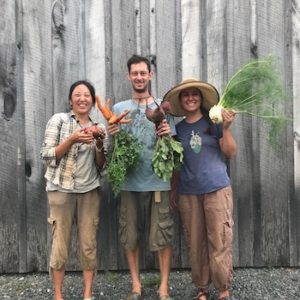 Through careful cultivation, Lydia’s Fields at Wheatland near Lovettsville offers major bounty with a twist. The farm has a new CSA program this year, offering both full and half shares, running May through September. “This is our chance to get to know the families we provide fresh food for,” says owner Robert Schubert. “We pride ourselves on freshness and good taste. And we follow USDA organic practices”.
Through careful cultivation, Lydia’s Fields at Wheatland near Lovettsville offers major bounty with a twist. The farm has a new CSA program this year, offering both full and half shares, running May through September. “This is our chance to get to know the families we provide fresh food for,” says owner Robert Schubert. “We pride ourselves on freshness and good taste. And we follow USDA organic practices”.
The program offers a wonderful mix of organically grown produce.You’ll find classics like heirloom tomatoes, peppers, and beans. But Lydia’s also offers bok choy, three types of spinach, asparagus, “pie” pumpkins, and two renowned varieties of sweet potato – not your everyday yam! Robert also hopes the 2020 growing season will yield a substantial harvest from the “House of Fig” – a temperature and water controlled environment designed to cultivate this delicious delight.
You can pick up your Lydia’s Fields CSA box at the farm, BChord Brewing Company or the MARC train station in Brunswick, MD. Membership is capped at the equivalent of 50 full shares. Robert’s eventual goal with Lydia’s CSA program is to evolve into a “private farmer’s market” where members only can shop for their share of produce a couple of times each week, offering more customization.
Protein CSA’s: Audley Farm‘s “A-List” Program
 Produce isn’t the only good eating with CSA’s. If you enjoy 100% all-natural, hormone, steroid, and antibiotic free Black Angus beef, check out the “A List Program” at Audley Farm in Berryville. This CSA is modeled after a visit to wineries in California and learning about wine clubs, says Business Manager Mary Kay Kobayashi. “Why aren’t we doing this with beef?”
Produce isn’t the only good eating with CSA’s. If you enjoy 100% all-natural, hormone, steroid, and antibiotic free Black Angus beef, check out the “A List Program” at Audley Farm in Berryville. This CSA is modeled after a visit to wineries in California and learning about wine clubs, says Business Manager Mary Kay Kobayashi. “Why aren’t we doing this with beef?”
The program is offered on a quarterly basis and members must commit to purchasing two quarters. A List Members receive 30-35 pounds of beef per quarter, says Mary Kay. And while that sounds like a lot, the vacuum packed frozen packages make for easy storing in a typical refrigerator’s freezer.
And there is some flexibility in your order. For example, says Mary Kay, you may want to increase your portion of ground beef if you have hungry college students home for the summer. Pick up is at the farm or the local farmers market in the summer.
Know Your Food: Spring House Farm
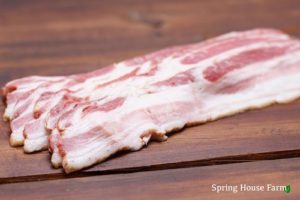 If you’re looking for pork, chicken, goat, and lamb as well as beef, then you’ll appreciate the diversity of Spring House Farm’s CSA programs. Not only are there three sizes of shares available bi-weekly, you can test your interest in the program by purchasing a prorated share.
If you’re looking for pork, chicken, goat, and lamb as well as beef, then you’ll appreciate the diversity of Spring House Farm’s CSA programs. Not only are there three sizes of shares available bi-weekly, you can test your interest in the program by purchasing a prorated share.
While a new cycle of CSA happens about every three months, says Retail Sales Manager Mary Torres, shares can actually be purchased at any time within any cycle. “For those curious about joining our CSA program, I suggest they join midway through the season. This way they are able to try out our program at a lesser cost to see if it is a good fit for them.”
Whole animal butchery is a major part of Spring House Farm’s sustainability. Says Mary, “We have a great variety of cuts and products available. I think it’s important to showcase our offerings in a way so CSA customers can try a little bit of everything and see what their favorites are. I do try to keep seasonal food trends in mind and pack things like burgers in the summer, and heartier roasts in the fall/winter.”
The CSA Hybrid: Paige’s Pit Stop
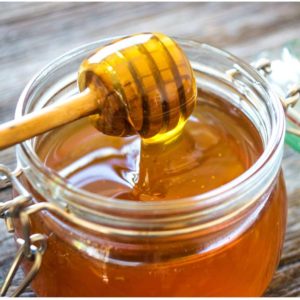 Can’t decide which direction to go – produce or protein? Then consider a share in a “hybrid” CSA program by Paige’s Pit Stop in Waterford. On a bi-weekly basis, participants will have a box of proteins, seasonal vegetables, eggs, bread, and locally sourced items from the store. Shares are sold on a quarterly basis.
Can’t decide which direction to go – produce or protein? Then consider a share in a “hybrid” CSA program by Paige’s Pit Stop in Waterford. On a bi-weekly basis, participants will have a box of proteins, seasonal vegetables, eggs, bread, and locally sourced items from the store. Shares are sold on a quarterly basis.
Paige came up with her hybrid CSA after talking with her customers. “People were asking,” says Paige. “And I wanted to be a little different and provide something they could make meals out of with a variety of meat, bread, eggs – maybe put a pie in there if its a holiday week.” In addition to buying from local sources, Paige also raises and butchers her own chickens and turkeys and grows vegetables for her store. Visit the Pit Stop and speak with Paige about her CSA hybrid.
Bon Appetit!
CSA programs are just one way to support locally sourced food. Visit Locally Sourced on Taste of Blue Ridge to learn about farmers markets, CSA Programs / pick-your-own farms, and community stores. Bon appetit!
